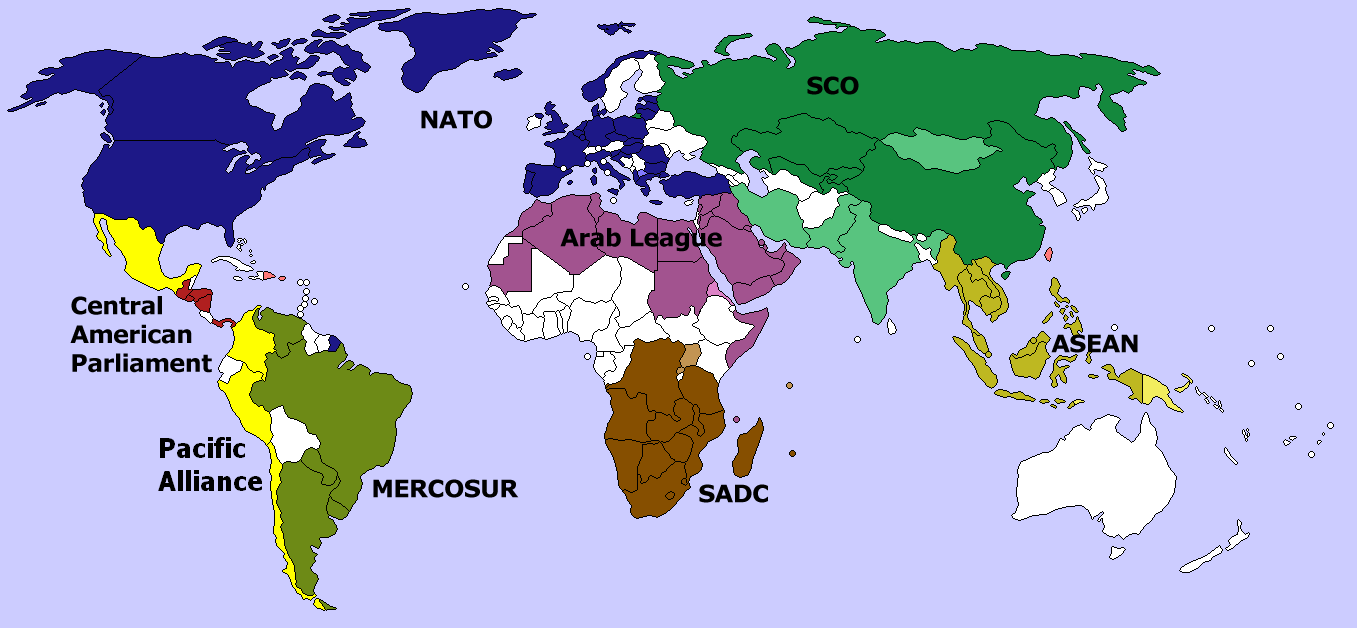Chapter 10: When Aliens Land – Global Governance and International Cooperation
When Global Cooperation Means Talking to Aliens and Managing Bureaucracy
10.3: Regional Organizations: NATO, EU, ASEAN
When survival is at stake, banding together can make all the difference. The principle of —the idea that an attack on one member of an alliance is an attack on all—is the backbone of military alliances like the . In Arrival, the global response to the alien spacecraft highlights what happens when such a principle is absent. Nations hesitate to trust one another, and without a binding framework to ensure mutual protection, they resort to independent decision-making that escalates tensions rather than diffusing them. This lack of unity contrasts sharply with NATO’s purpose during the Cold War, when Western nations united to deter Soviet aggression through a promise of mutual defense. NATO’s Article 5, famously invoked after the 9/11 attacks, is a real-world demonstration of collective defense in action, showing how an alliance built on trust can adapt to threats like terrorism. In the film, China’s decision to prepare a unilateral military response to the aliens reflects the breakdown of trust that occurs when countries act outside of a collective security structure. Real-world examples like NATO’s involvement in Afghanistan, where member states worked together to counter global terrorism, highlight how alliances can evolve to address modern threats. However, Arrival also shows that even shared dangers don’t always lead to cooperation, which is where deeper forms of collaboration, such as , can play a role.

Sometimes, cooperation requires countries to give up a little sovereignty to gain a lot of stability. Supranationalism involves nations transferring some decision-making authority to higher organizations that can act on behalf of the collective. This approach enables deeper integration and a more unified response to challenges. In the , member states have pooled sovereignty in areas like trade, environmental policy, and monetary policy, creating one of the most successful examples of supranational governance. In Arrival, the inability of nations to act as a cohesive unit highlights the risks of maintaining complete national independence during a crisis. For example, while some nations in the film agree to share information about the aliens’ language and intentions, others act unilaterally, leading to confusion and the risk of armed conflict. The EU, by contrast, demonstrates the benefits of collective action, as seen during the eurozone crisis of 2009. Despite significant economic strain, EU institutions managed to stabilize member economies through coordinated reforms and financial assistance. However, supranationalism is not without controversy; the Brexit referendum in 2016 revealed the tensions between national sovereignty and collective governance, as the United Kingdom chose to leave the EU. This tension mirrors the conflict in Arrival, where some nations prioritize autonomy over collaboration. While supranationalism can deepen integration among willing states, other regions, like Southeast Asia, have adopted a more consensus-driven approach.
Regional cooperation isn’t limited to the West. The offers a unique model of collaboration among Southeast Asian nations, prioritizing consensus and non-interference. Unlike NATO’s emphasis on collective defense or the EU’s deep integration, ASEAN focuses on maintaining harmony and managing regional stability through dialogue and cooperation. ASEAN’s approach to maintaining peace could offer lessons for such scenarios. For example, ASEAN has played a pivotal role in managing disputes in the South China Sea, fostering dialogue among member states and external powers like China and the United States to prevent conflict. While it avoids supranationalism, ASEAN’s collaborative approach reflects the importance of creating platforms for negotiation and trust-building. ASEAN’s balance of sovereignty and collaboration provides a different model of regional governance, which complements the military and economic approaches of NATO and the EU. Together, these organizations show that regional frameworks can adapt to meet diverse needs, from security to economic growth.
Regional organizations like NATO, the EU, and ASEAN demonstrate the power—and the complexities—of collective action in a world of shared challenges. NATO’s collective defense ensures that member states stand united in the face of security threats, while the EU’s supranationalism fosters deep economic and political integration. ASEAN, with its emphasis on consensus and non-interference, provides an alternative model of regional cooperation. In Arrival, the absence of effective frameworks for collaboration highlights the risks of unilateralism, where mistrust and miscommunication lead to escalating tensions. The film serves as a reminder that cooperation, while difficult, is essential for tackling global crises, whether they involve alien ships, climate change, or geopolitical conflicts. By exploring the distinct approaches of regional organizations, we see how they contribute to global stability, each offering unique strengths and challenges in the pursuit of collective solutions.
The principle that an attack on one member of a military alliance, such as NATO, is considered an attack on all members, ensuring mutual protection.
A military alliance of Western countries formed in 1949 to provide collective security against the Soviet Union, now focusing on broader security issues, including terrorism and cyber threats.
The delegation of authority from individual states to a higher organizational level, as seen in the EU where member states transfer some sovereignty to EU institutions.
A regional organization promoting political and economic integration among European countries, aimed at maintaining stability, democracy, and economic growth in the region.
A regional organization promoting political and economic cooperation among Southeast Asian nations, focused on maintaining regional stability and security.


Feedback/Errata
1 Response to Chapter 10: When Aliens Land – Global Governance and International Cooperation